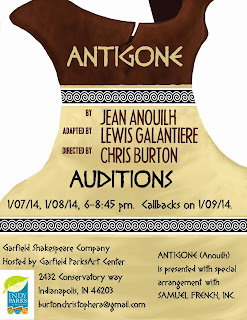Our auditions were rather slim for this show, with about a half dozen people able to come each night. This was entirely due to the weather - our first auditions were the day after Indiana was hit with 8 inches of snow overnight. My production team and I made the decision to extend auditions to Saturday 1/11 and Tuesday 1/14. Because of the volume of performers at each audition, and the way they ran them, we were able to see people read for multiple roles in many different combinations. I was even able to give direction and run rehearsals of small scenes, which aided in the construction of the cast greatly.
Here is the cast list:
We made several interesting discoveries during the audition process, and I have decided to have the Messenger, Page, and Eurydice add to the voice of the Chorus at key moments.
The rehearsal process begins this Saturday, 1/18 at 1:00pm at the Garfield Park Arts Center main gallery. Rehearsals will run typically Tuesday and Thursday evenings, from 6:00pm - 8:45pm (the building closes at 9:00pm) and Saturdays from 1:00pm - 3:45pm. Rehearsals are considered open, and all patrons of the Garfield Park Arts Center are welcome to take a peek at our process.











